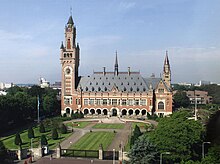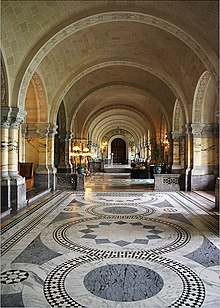User:Haskell1918/Ramskells (The Black Cat of the Peace Palace)
| This is not a Wikipedia article: It is an individual user's work-in-progress page, and may be incomplete and/or unreliable. For guidance on developing this draft, see Wikipedia:So you made a userspace draft. Find sources: Google (books · news · scholar · free images · WP refs) · FENS · JSTOR · TWL |
Ramskells (The Black Cat of the Peace Palace)
[edit]
Ramskells was a feral British Bombay cat[1], adopted by the justices of the International Court of Justice. In the Spring of 1924, a fire broke out at the Peace Palace trapping the justices inside. Ramskells, who was fiercely loyal to the justices, lead the ICJ members to safety through the fire. Although all ICJ members made it to safety, Ramskells was overcome with smoke inhalation and passed away three days after the fire. Unable to overcome the loss of the cat, the justices demanded a memorial to Ramskells be erected on the Peace Palace grounds. The memorial, a 7 ft high statue of Ramskells, still stands on the Peace Palace grounds.
Kittenhood
[edit]The age of Ramskells is unknown. He was first discovered by a Peace Palace groundskeeper in the Summer of 1922.[2] The groundskeeper, 17 year old Hispanel Peralta,

was working in the famous Peace Palace gardens tending to his tulips when he stumbled across the stray cat. Lonely and without friends at the Peace Palace, Peralta kept Ramskells with him in his makeshift apartment located in the Peace Palace grounds toolshed. Every day Ramskells accompanied Peralta in the gardens and grounds as Peralta worked. However, because of Peralta's meager earnings he was unable to feed Ramskells. As a result, Ramskells would tour the Peace Palace in search of whatever scraps he could find.
Cathood
[edit]As was their usual morning routine, on April 23rd 1923 the ICJ justices were sitting in the Peace Palace lounge drinking their tea and enjoying their breakfast of croissants and jam. Unbeknownst to the justices Ramskells had been drawn by the smell of the delicious food and found his way into the lounge. Although accounts are indispute, many believe that Ramskells introduced himself to the justices by jumping on the lounge table and snatching one of the croissants off the plate of one of the justices.[3] Other accounts state that Ramskells was discovered by one of the justices, purring wildly, and decided to invite Ramskells into the lounge.[4] Regardless of how the encounter occured, it would change the course of world history.
The Fire
[edit]On approximately March 22nd, 1924, a fire broke out in the early morning in the Peace Palace.[5] The origins of the fire are unknown, although lore around Den Haag residents is that a seagull knocked over a lantern that had been left by a some turpintine. The fire, which started at the front entrance of the Peace Palace, quickly spread throughout the rest of the building. As much of the staff was away in Amsterdam, the only persons inside of the building were the justices and their soon to be heroic cat Ramskells. Still sleeping when the fire spread to the second floor, the justices were unaware of the danger lurking down the hall from their bedrooms. Ramskells, who now slept in the lounge, quickly went to each of the bedrooms and attempted to wake the justices. Unable to awake them by scratching at the thick, wooden doors, Ramskells went through the open window in the lounge and scurried across the roof to the first open window, leading into the president's bedroom. Ramskells quickly alerted the president by jumping on his chest and meowing loudly.[6] Finally awaking the president, the smoke from the fire had filled the hallway and was now filling the bedroom. Gasping and choking, Ramskells lead the president to the bedroom's of the other justices to wake them and get them out of the Peace Palace. After getting everyone out of their bedrooms, the justices quickly realized that the fire had blocked their only known escape route. Ramskells, familiar with the Peace Palace from his days wandering the grounds, gained the attention of the frantic justices by clawing and biting the leg of the president.

Not knowing why the cat was heading down the hallway in the opposite direction of the only known escape route, the justices decided to follow their loyal friend. Ramskells led the justices through the thick smoke into a secret corridor behind a large painting in the bedroom of the most junior justice.[7] The corridor, originally built to allow access for the builders of the Peace Palace to transport materials to finish construction of the second floor, was unknown to the justices. After walking through the small, 1500 foot long corridor, the justices, led by Ramskells, made it safely out of the burning Peace Palace.
As the justices stood in amazement as the ravaging fire consumed the entire structure, the president looked for the heroic cat. Unable to find him at first, the president's attention was drawn to wheezing in the bushes near where the justices escaped to safety. To the president's horror he found a sick and weak Ramskells. Despite attempts to revive him, Ramskells lapsed into a coma and passed away three days later.[8]
The Memorial
[edit]Overcome with grief at the loss of their loyal and heroic friend, the justices demanded that a memorial be made for Ramskells. After a long and exhaustive search, a local artist named Brettamore Higgs was commissioned to create the memorial.[9] Higgs, known at the time for his ornate cat sculptures, constructed the memorial out of rare local granite. Despite the protests of towns people over the use of such a valuable mineral, the justices demanded that the memorial be constructed as planned. The statue depicts Ramskells in a sitting position and, according to Higgs, bravely staring into the fire. The statute, which is not enscribed, is called "The Cat that Saved International Peace and Justice."[10]
Today, the memorial still stands on the Peace Palace grounds. Local resident Unique Legerman is the foremost expert on the story of Ramskells and the fire. She is the primary caretaker of the memorial, and every morning, upon maintaining and cleaning the memorial, says a prayer before the statue in the name of world peace and justice.[11]
References
[edit]- ^ Bombay Cat, Wikipedia. http://en.wikipedia.org/wiki/Bombay_cat
- ^ Bombay Cat, Wikipedia. http://en.wikipedia.org/wiki/Bombay_cat
- ^ Bombay Cat, Wikipedia. http://en.wikipedia.org/wiki/Bombay_cat
- ^ Bombay Cat, Wikipedia. http://en.wikipedia.org/wiki/Bombay_cat
- ^ Bombay Cat, Wikipedia. http://en.wikipedia.org/wiki/Bombay_cat
- ^ Bombay Cat, Wikipedia. http://en.wikipedia.org/wiki/Bombay_cat
- ^ Bombay Cat, Wikipedia. http://en.wikipedia.org/wiki/Bombay_cat
- ^ Bombay Cat, Wikipedia. http://en.wikipedia.org/wiki/Bombay_cat
- ^ Bombay Cat, Wikipedia. http://en.wikipedia.org/wiki/Bombay_cat
- ^ Legerman, Unique. "Ramskells: The cat that saved International Justice and Peace." Leiden University Press, 2001
- ^ Legerman, Unique. "Ramskells: The cat that saved International Justice and Peace." Leiden University Press, 2001
Legerman, Unique. "Ramskells: The cat that saved International Justice and Peace." Leiden University Press, 2001.

